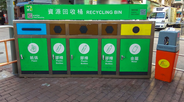The Ombudsman, Ms Winnie Chiu, today (28 April) announced the completion of a direct investigation into the management and effectiveness of waste separation bins, and made six recommendations for improvement to the Environmental Protection Department (EPD).
Since 1998, the Government has provided waste separation bins (commonly known as “three-colour recycling bins” and hereafter “recycling bins”) for collection of waste paper, aluminium cans and plastic bottles, thereby encouraging the public to participate in waste reduction and recycling. There were media reports that recycling bins were mixed with litter, and some recyclables collection service contractors (the Contractors), for various reasons, disposed of recyclables from recycling bins together with refuse, thus undermining public confidence in the authorities’ effective management of the recycling bins.
The investigation by the Office of The Ombudsman revealed that since 1 October, 2020, the EPD had taken over the management of recycling bins in public places from the Food and Environmental Hygiene Department and implemented a number of improvement measures to achieve the goal of “bigger capacity, easy reporting”. The EPD has also stepped up the monitoring of the Contractor through different means, including through the supervision teams formed by the Contractor as required by the EPD and the quality assurance teams set up by a third-party organisation (i.e. the Hong Kong Productivity Council), as well as EPD staff. Since the implementation of the above improvement measures by the EPD, there has been initial improvement in the management of recycling bins in public places.
Meanwhile, the investigation by the Office revealed that the existing labels on recycling bins in public places were overly simple, thereby failing to effectively minimise improper use of the bins. During site visits for a random sample of recycling bins, the Office also found inconsistencies related to several locations indicated by the “Waste Less” mobile application of the EPD with the actual site situation. Fortunately, the EPD updated the information on the app in early February 2022.
In the long run, the EPD anticipates a declining demand for roadside recycling bins in urban areas. The role of recycling bins will also gradually transform into providing waste recycling support mainly for remote rural areas and residential premises on scattered sites. Such bins may even be completely replaced by the community recycling network Green@Community.
Ms Chiu said, “The provision of recycling bins has been implemented by the Government for years. While the quantity of recyclables collected from recycling bins in public places such as roadsides is limited, amounting to less than 0.1 per cent of the total amount of recyclables in Hong Kong annually, these bins are very conspicuous in the community. The effectiveness of these bins will directly affect public confidence in the authorities’ measures on waste separation and recovery. The Office is pleased to learn that the EPD has implemented multiple improvement measures since it took over the management of recycling bins in public places in October 2020, with initial improvements to the management of the bins. We find the efforts of the EPD commendable. We expect it to continue monitoring the usage of recycling bins, stepping up publicity and education, and strengthening collaboration with other government departments, so as to revive public confidence in using recycling bins.”
The Office has made six recommendations to the EPD as follows:
- Review the labels on recycling bins in public places and consider providing more recycling information in textual and graphical forms to enable the public to learn about more quickly and conveniently the proper way of using recycling bins;
- Update the “Waste Less” mobile application in a timely manner to ensure accuracy of information about recycling bins in public places;
- Continue strengthening collaboration with other departments responsible for recycling bin management and actively encourage them to maintain more recycling data, thereby facilitating the monitoring and adjustment of the management strategies of recycling bins;
- Release data on the operation of recycling bins in public places regularly to enhance transparency of its services and facilitate an objective understanding of the current effectiveness of recycling bins by the public
- Continue stepping up publicity and education, including sharing via different channels success cases about how members of the public use recycling bins, thereby encouraging more people to take part in waste reduction and recovery, and reviving public confidence in the effectiveness of recycling bins; and
- Work out a schedule to review the policy positioning of recycling bins in public places for deciding on the way forward, and explain its decision for the public to understand why recycling bins in the community may be gradually reduced in number or even completely replaced. If it is decided that recycling bins in public places be retained, continue assessing any impact arising from waste charging due to be implemented later, and adopt corresponding measures to ensure that recycling bins in public places will continue to achieve efficacy.
The EPD has accepted all of the recommendations.
The full investigation report has been uploaded to the website of the Office of The Ombudsman for public viewing.
Source: Office of The Ombudsman of Hong Kong, China

